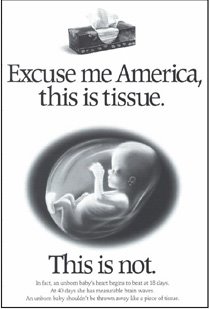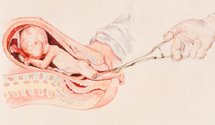Baptist Press Reports on Abortion-Breast Cancer Link

Baptist Press is carrying a very good article on the abortion—breast cancer (ABC) link.
Read this insightful report.
Studies point to abortion-breast cancer link
WASHINGTON (BP)--Ireland has the lowest rate of breast cancer out of nine selected European countries, and it also has the lowest rate of abortion.
These findings are part of a study that may provide new evidence for a connection between abortion and breast cancer. It is one of two such reports released in separate medical journals in October, which is Breast Cancer Awareness Month.
"The South East of England has more breast cancer than other parts of the British Isles. It also has the highest abortion rate," Patrick Carroll wrote in the Journal of American Physicians and Surgeons.
Carroll, a scientist who researches epidemics, mapped the trends of high rates of breast cancer with rates of abortion in nine different European countries, including Scotland, Finland, Denmark, Ireland and England, and found the two to be correlative.
His report was published just two days after the journal Cancer Research published its findings on the connection between the existence of fetal cells in a mother's blood stream and the occurrence of breast cancer.
The fetal cell study, conducted at the Fred Hutchinson Cancer Research Center in Seattle, was an attempt to explain the known effect of child bearing in reducing a woman's chances of breast cancer.
Although many are unaware of the link between a woman's reproductive history -- especially a previous abortion -— and breast cancer, it is an important risk factor, says Karen Malec of the Coalition on Abortion/Breast Cancer.
There is resistance among some organizations that educate women about breast cancer to making the connection between abortion and the disease. These include the American Cancer Society and Susan G. Komen for the Cure.
Baptist Press contacted the Internet site breastcancer.org but was not granted an interview with its president, Marisa Weiss. The website describes itself as the "world's most trafficked online resource for medically reviewed breast health and breast cancer information" but makes no mention of reproductive history as a risk factor.
Most of these organizations cite a study conducted by the National Cancer Institute.
"In March 2003, the National Cancer Institute's Board of Scientific Advisors and Board of Scientific Counselors unanimously agreed that epidemiological evidence does not support any association between abortion and breast cancer," according to information on the Komen website.
While most agree there is a link between the first pregnancy and reducing the risk of cancer, the independent link between abortion and the risk is disputed.
Researchers like Carroll and activists like Malec insist there is a link.
"This is Breast Cancer Awareness Month, and there is no mention of this issue on [my opposition's] websites," Malec said. "I think it's egregious."
The correlation that is often cited between abortion and breast cancer exists in the development of breast tissue during pregnancy. At the beginning stages of pregnancy, hormones start the maturation process of breast lobules to prepare the body for breast feeding, Malec told Baptist Press.
"These lobules progress from type one ... [to] type four. Once they become type four, they are permanently cancer resistant," Malec said.
A report produced by the Breast Cancer Prevention Institute also shows this link.
"Induced abortion leaves a woman with more places for breast cancer to start," according to the BCPI report. "A woman who has a full-term pregnancy decreases her breast cancer risk."
A woman who has an abortion often has more vulnerable, type one breast tissue than she did before she got pregnant. A higher risk of malignant growths results, with "95 percent of all breast cancers known to arise in type one lobules," Malec said.
"A little bit of pregnancy doesn't protect women from cancer," she said.
Induced abortion has a higher risk than spontaneous abortion (miscarriage), according to BCPI, because of the exposure to pregnancy hormones. When a woman miscarries because of an abnormality, the hormones estrogen and progesterone do not reach the same levels as a normal pregnancy, and the maturation of breast tissue does not progress, the report said.
The Cancer Research study on fetal cells was looking for another reason other than breast tissue maturation to explain why child bearing might be more protective. During normal pregnancy, fetal cells enter the mother's bloodstream. These cells, called fetal microchimerism (FMc), stay in the mother's peripheral blood stream and possibly could act as watchdogs against malignant cells in the mother's body, according to Vijayakrishna Gadi and J. Lee Nelson, the researchers who conducted the study.
In-depth looks into the societal trends of women's reproductive habits and high breast cancer rates can be used as a predictor across entire countries, Carroll said. He chose the nine European countries as case studies because of the comprehensive data available on abortion incidence. He looked at seven different risk factors, including hormonal contraceptives and a low age at first birth, that might be used to determine breast cancer rates.
Carroll concluded the best predictor for breast cancer is induced abortion.
He also observed certain trends among social classes and found breast cancer to be more common in upper-class women, who may be busy pursuing their careers and college degrees, and choose abortion.
"Higher-class women have a later age at first birth and consequently higher-class women have nulliparous [never giving birth] abortions, which are more carcinogenic," the study said.
Reducing the risk of breast cancer is possible even if a woman has had an induced abortion, according to BCPI.
"There is some data to suggest that the sooner a woman delivers and nurses a child after having had a prior induced abortion, the smaller the risk increase from the abortion," the BCPI report said. Having babies earlier in life, breast feeding those babies, maintaining a healthy weight and not smoking are ways to reduce risk for breast cancer, according to BCPI.


























0 Comments:
Post a Comment
<< Home